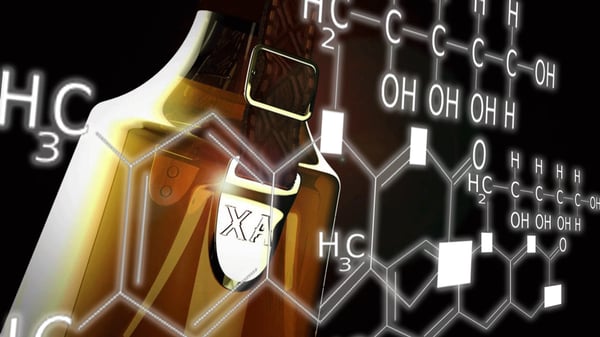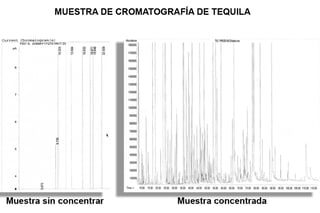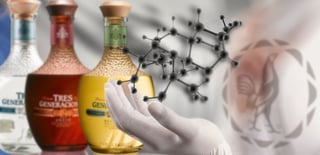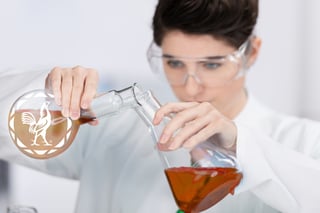
Tequila is a spirit drink obtained from the distillation of the fermented musts of cooked agave juices. The chemical composition of this beverage is approximately 99% of a mixture: alcohol (ethanol) and water; however, the remaining 1% is what makes the difference. Let's talk about the chemical composition of tequila.
Tequila's Chromatography Footprint
Tequila's regulation (NOM-006-SCFI-2012) mentions around a dozen of chemical compounds to follow. Still, when analysis tests in which the compounds are concentrated are run, we actually observe more then a hundred compounds.
This results are amazing, similar to observing a water drop though a microscope and discovering how something so simple turns -with the help of a microscope- into something so complex and diverse.
You can watch this facts yourself in the following images.
(Non-concentrated sample/Concentrated sample)

Can Synthetic Tequila be Made?
I once read in a journal that American scientists identified and quantified around 160 compounds in a tequila. They then prepared a solution making use of those same compounds, with the same amount of concentration. That is, they tried to produce a synthetic beverage based on tequila's chemical composition. The result was a quite frustrating, since the organoleptic features of this beverage did not match those of the natural tequila.
What happened? 160 compounds and still, it could not match natural tequila, how was that possible?
How Many Chemical Compounds Does Tequila Have?
As a chemist and with my experience in the field, I can tell you that natural tequila is not made up of just 160 chemical compounds. It is made of many more compounds.
One of Casa Sauza's main goals is to establish the sensory profiles not just of "tequila" as our final product, but of each intermediate product (by-products), on every stage of the production process.
Methodology for Tequila's Chemical Analysis

It might seem simple to establish sensory profiles, yet it is a hard job that requires specialized technical knowledge from those who carry this process out. The knowledge they have on analysis techniques and the reach and limitations they have, is key.
Gas chromatography with mass spectrometry is the most used technique for this application. Gas chromatography is used to separate the compounds that make up the sample, which in our case is tequila. Once the compounds are separated, they will be identified and quantified by mass spectrometry.
As I mentioned at the beginning of this article, it is very important to concentrate the compounds by means of and extraction technique. The most common technique that is applied is the liquid-liquid extraction in which an organic immiscible with tequila solvent is used. They are both vigorously stirred in a separating funnel. Once the compounds have migrated to the organic solvent, the latter is evaporated in a special device. This is how we get to concentrate the compounds.
Benefits of Knowing the Chemical/Sensory Profiles of Tequilas.
- In the case of adulterations, the differences between authentic and fake tequila can be scientifically shown
- Each tequila company may establish the chemical/aromatic standards for each of the tequilas it produces.
- In the case of rested, vintage and ultra-aged tequilas, the real degree of aging can be identified, that is, the chemical/aromatic contribution that wood provides to the tequila can be known.

Other uses of Chemical/Sensory Profiles
Finally, it is worth mentioning that this technique is not exclusive for tequila. It can be applied to any kind of alcoholic beverage. It can also be used to monitor each of the by-products that are generated on each of the production stages of the alcoholic beverage.
Learn more about the way we produce tequila at Casa Sauza. Find out why our the tequila is the purest one that you will find in the market!
.png?width=50&height=50&name=10.CS-Redondo%20(1).png)

